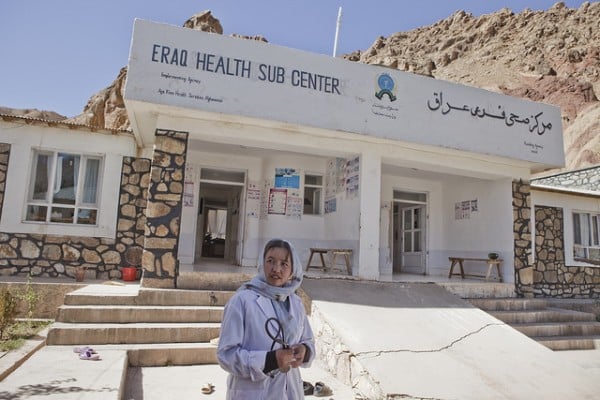| Online: | |
| Visits: | |
| Stories: |

| Story Views | |
| Now: | |
| Last Hour: | |
| Last 24 Hours: | |
| Total: | |
Getting the Motives Right

An Aga Khan health center in Afghanistan.
The recent attack against Ismaili Muslims in Karachi, Pakistan, will be read by most as part of a simple narrative of an ongoing Sunni-Shi’ah conflict. Unfortunately, as consistent fear-mongering has demonstrated with Sharia, bandying about non-English words conveys a facade of knowledge without any guarantee of any actual understanding. As is the case with most political violence, here is more to this attack than a simple retelling of a religious clash. There is a deeper history that is masked by using inappropriate vocabulary, and misusing it is allowing the most extreme voices to set the agenda.
Contrary to popular opinion, history shows that there is not a 1,400-year old conflict between Sunni and Shi’ah. Instead, we need to understand the violence in Pakistan as having a strong political rationale. To miss what this attack was about allows slogans about Islam to triumph over real knowledge of the religion and region, dishonors the victims of terrorism and ultimately weakens U.S. national security.
The Ismaili community is a small Shi’ah community that is different from the Ithna’ashari, or Twelver, Shi’ah community that dominates in Iraq and Iran. It is the only Shi’ah community to have a present, living Imam, (a divinely appointed successor to Prophet Muhammad) in the Aga Khan.
The office of the Shi’ah Imam, not to be confused with the Sunni imam, or prayer leader, represents one of the greatest threats to movements like Daesh, otherwise known as the Islamic State in Iraq and Syria (ISIS). Daesh has a nihilist vision of an Islam that can only destroy, not construct, and their use of grandiose titles like “Islamic State” and “caliph” are flailing attempts to show they can build, not just kill. Shi’ah communities, like Sufi orders, offer an alternative authority structure and vision of what it means to be Muslim to the nihilists. There are important theological differences, and these are manifest in the histories that are told and the actions that communities take.
The key is that as long as Shi’ah and Sufi groups exist, with their structures, hierarchies, and well-established means of interacting with the outside world, nihilists cannot claim to be the sole and logical representation of “Islam” in the world. The Aga Khan, for example, established one of the largest hospital networks in Pakistan, a constructive and ethical engagement with the faith. This story is less often told in the media when juxtaposed against ISIS’ atrocities.
Even a week after the attacks in Pakistan, we still do not know who is responsible for them. There are many groups who want to claim credit for these attacks because these nihilist groups offer nothing but death, and they reap political benefits if they can say they are the most destructive. They are operationally interchangeable and can only compete in the realm of body counts. They benefit when we describe Muslim communities as “sects” because that implies a true Islam to which they can lay claim. This naming is not part of the Muslim tradition — it only gives the nihilists legitimacy.
All of these groups are the spawn of the Wahhabi movement. This movement, which originated in the 18th century, and eventually rose to power by allying with the British Empire to kill rival Muslims, cannot be considered Sunni. It represents an innovation, creating a new community of interpretation.
The terrorist attack that killed 47 Muslims, many women and children, continues to demonstrate the depravity of nihilist groups. However, to read it as part of an ongoing conflict rooted in theology makes too easy an analogy between Christianity and Islam and misses the deeper lessons. We need to move beyond simple labels of Sunni and Shi’ah, and not give the most depraved elements of a society and opportunity to claim legitimacy for themselves.
Hussein Rashid is a professor of religion at Hofstra University, a term member at the Council on Foreign Relations and a Fellow with the Truman National Security Project. He works at the intersection of religion, art and national identity. Views expressed are his own.
Source: http://foreignpolicyblogs.com/2015/05/26/getting-the-motives-right/



